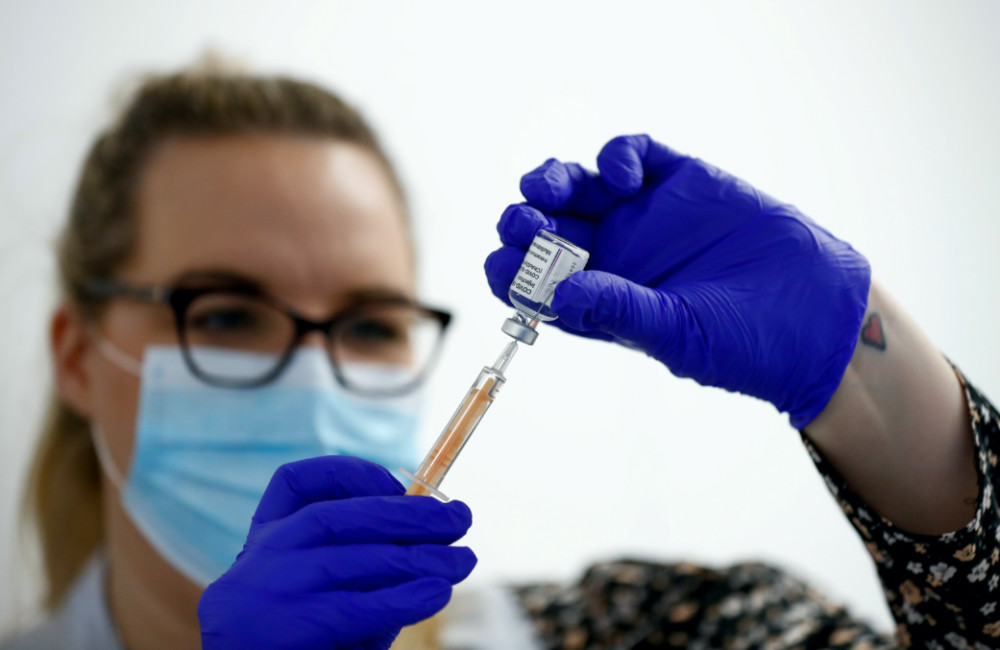London, UK
Reuters
People across the world are generally likely to say yes to getting a COVID-19 vaccine, but would be more distrustful of shots made in China or Russia than those developed in Germany or the United States, an international poll shows.
The survey, conducted by the polling company YouGov and shared exclusively with Reuters, found Britons and Danes were the most willing to take the COVID-19 vaccine when it becomes available to them, while the French and Poles were more likely to be hesitant.

A health worker fills a syringe with a dose of the Oxford/AstraZeneca COVID-19 vaccine at the Appleton Village Pharmacy, amid the coronavirus disease outbreak, in Widnes, Britain, on 14th January. PICTURE: Reuters/Jason Cairnduff.
The poll was based on questions put to almost 19,000 people.
It also found that willingness to take the COVID-19 vaccine has been improving in many countries in recent weeks, just as shots developed by companies in the United States, Russia, China, Germany and Britain were starting to be delivered and administered in countries across Europe, North America and Asia.
WORLD IS IN A RACE WITH A CORONAVIRUS TRYING TO MUTATE, WHO SAYS
The world is in a race with a coronavirus trying to mutate and new variants need quick and intense research, the head of the World Health Organization’s Emergency Committee of independent experts on COVID-19, Didier Houssin, said on Friday.
“The situation is presently…we are a little bit paralysed, a little bit confused,” he told a virtual briefing in Geneva. “Clearly the question of travel, by air, by road and sea, needs to be perhaps better organised.”
Meanwhile, World Health Organization chief Tedros Adhanom Ghebreyesus said on Friday that the world is failing to break chains of coronavirus transmission at community and household levels.
“We need to close the gap between intent and implementation at the country and individual level,” he told a virtual briefing in Geneva. “This is putting immense pressure on hospitals and health workers.”
– STEPHANIE NEBEHAY, EMMA FARGE and MICHEAL SHIELDS, Reuters
In Britain, 73 per cent of people said they would get vaccinated, while in Denmark the number was 70 per cent.
In the United States, however, just less than half of those surveyed said they would be willing to have a COVID-19 vaccine, a figure that has remained broadly stable since July.
More than a third of people surveyed in Poland and almost half in France – 37 per cent and 48 per cent respectively – said they would say no to a COVID-19 shot if offered it.
Wait and see
Confidence among populations about vaccines will be a key factor in governments’ efforts to curb the rate of infections in the year-long SARS-CoV-2 coronavirus pandemic, which has infected more than 92 million people worldwide and killed at least 1.98 million.
A study published by vaccine confidence researchers in November found that conspiracy theories and misinformation fuels mistrust and could push COVID-19 shot uptake rates below levels needed to protect communities against the disease.
Friday’s YouGov poll found that, while sizeable minorities in many countries said they would not take the COVID-19 vaccine now, most gave their reason as preferring to wait and see if the vaccines were safe, and few were driven by entrenched “anti-vaxxer” views.
In France, for example, the proportion of the population saying they’d refuse the vaccine because they were “opposed to vaccines in general” was highest at nine per cent, but still far lower than the percentage who would reject a COVID-19 vaccine specifically.
With COVID-19 vaccine production and delivery beginning to ramp up, the YouGov poll also surveyed attitudes to compulsory COVID-19 vaccination – a policy under discussion by some governments to try and get as many people as possible immunised.
Such a move was most popular in India at 77 per cent, Indonesia at 71 per cent and Mexico at 65 per cent. Britons were split, with 40 per cent supportive and 42 per cent opposed, Americans tended to oppose the idea, at 46 per cent compared with only 29 per cent who would back mandatory vaccinations.





